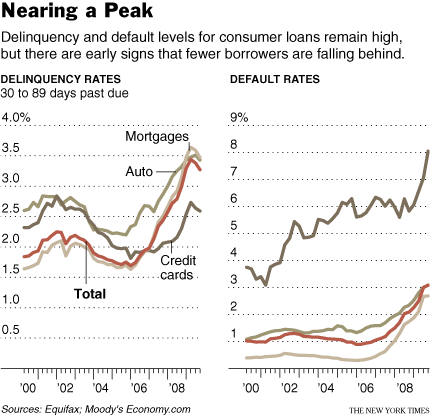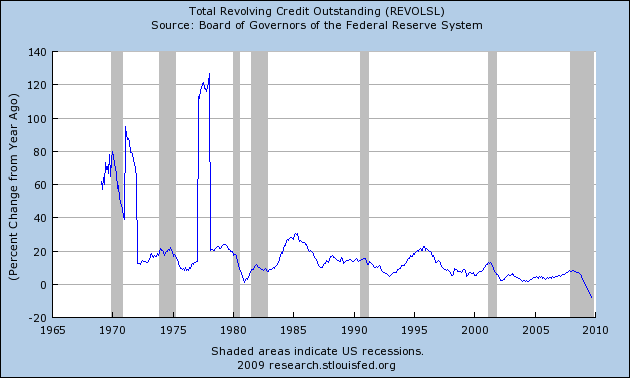JP Morgan the new Lehman Brothers: Why Make Money through Commercial Banking when you can become a taxpayer backed Investment Bank. How JP Morgan Really made the $3.6 Billion in Q3 Profits.
- 2 Comment
Toxic mortgages and credit card losses through defaults are rising at a rapid pace. This was also apparent in the earnings report from JP Morgan that reported positive earnings because of non-retail banking activities. Yet the media for whatever reason isn’t highlighting more carefully where the gains are coming from. For example, JP Morgan which swallowed up Washington Mutual and Bear Stearns, posted losses on credit cards and home mortgages yet doubled its earnings from last year in its investment banking division. Here is one of the key examples of why removing Glass-Steagall is such a major problem. The recent meteoric rise in stock prices merely reflects hot money trying to find ground. If we look at actual loan losses they are still on the rise:
Source: New York Times
And banks are not lending more as they stated initially with the request for bailout funds. The premise was that trillions were needed or lending would completely dry up. Lending has dried up. Take the mortgage market for example. Loans that are FHA insured now make up the bulk of the market. For non-FHA loans, banks seek to have loans backed by Fannie Mae, Freddie Mac, or Ginnie Mae. In other words, banks are unwilling to lend their own money and will only lend funds backed by the government (aka the American taxpayer).
This behavior is most pronounced with credit cards. With rising defaults companies are using bailout funds to plug up additional losses. Yet they are also combining the easy money to play their hand on Wall Street. The mix of retail and commercial banking is still occurring even after our economy nearly tanked and we are still in recession nearly 2 years later.
I had an experience with the credit card companies recently that shows what is occurring. One of my cards had a line of $10,000 but I rarely use it. If I did use it, I would pay it off every month. Credit card companies look at people that pay off their balance every month as deadbeats. So last month, I receive a letter stating my balance was lowered to $3,000 simply because my lack of use. Keep in mind that this line had been open for 7 years. So I call up the bank and they tell me I can either stay with the new terms or close my account. This is how banks are playing the system and stealing money from taxpayers.
Don’t be fooled, they are pulling credit back:
Banks are still pulling credit cards out of the system on top of the 8 million that were pulled in the first quarter of 2009. Let us look at how JP Morgan turned a $3.6 billion profit in the third quarter more carefully.
“New York, October 14, 2009 – JPMorgan Chase & Co. (NYSE: JPM) today reported third-quarter 2009 net income of $3.6 billion, compared with net income of $527 million in the third quarter of 2008. Earnings per share were $0.82, compared with $0.09 in the prior year.
Jamie Dimon, Chairman and Chief Executive Officer, commented: “Our net income of $3.6Â billion in the quarter reflected the strong earnings power of the company, with broad-based growth across the Investment Bank, Asset Management, Commercial Banking and Retail Banking. However, credit costs remain high and are expected to stay elevated for the foreseeable future in the Consumer Lending and Card Services loan portfolios. Accordingly, we have added $2.0Â billion to our consumer credit reserves, bringing the firmwide total to $31.5Â billion, or 5.3%1 of total loans. Tier 1 Common Capital, another key element of our fortress balance sheet, was also strengthened through capital generation during the quarter, to $101Â billion, or 8.2%.”
In other words, JP Morgan made a bulk of its profits in sectors that pre-1999 (Glass-Steagall) would not have been allowed for commercial banks. They are operating as a gigantic hybrid of old school banking with casino style investment banking on Wall Street. Keep in mind JP Morgan is one of the too big to fail darlings. Instead of opening consumer credit, they are pulling back on it to the tune of $2 billion in reserves for future losses.
The below comes from their 8-K filing. How much of that $3.6 billion came from their i-bank division? Over 50 percent of it:
A large chunk of it came from the investment banking division. I don’t think the American public had in mind when they handed trillions to the banks that they would be using the money to gamble on Wall Street. Surely they are doing something through their retail side?
Nope. In fact, this is where they are adding loss provisions to the continued deterioration of the Washington Mutual loans. Average total deposits decreased over the quarter by 2 percent. Branch sale of credit cards were down 18 percent. As you would imagine, they are losing money through their credit card division:
So much for the average American. But where else did the big money come in for the $3.6 billion in profits if it wasn’t through the average Joe and Mary on the street? Corporate and private equity:
And there it is. You might as well label JP Morgan the new Lehman Brothers because they are operating like an investment bank. So much for those bailouts helping the average American. The media really needs to scrutinize how these companies make their earnings. They are simply using hot and easy money to double down in the Wall Street casino on the taxpayer dime. No reform has happened since the collapse of Wall Street because these banks own our politicians.
If you enjoyed this post click here to subscribe to a complete feed and stay up to date with today’s challenging market!2 Comments on this post
Trackbacks
-
me said:
With the bank side in need of both additional capital and increasing loan loss reserves, it begs the question as to why management is so bent on paying out such large bonuses – to themselves. They are not working for the shareholders, however it appears that they are in the process of looting the bank from within… just my opinion and observation.
October 18th, 2009 at 3:40 pm -
Robert J Molineaux, Redfield, New York said:
Me (previous poster) is correct. We are talking about massive embezzlements here. It is time for RICO act prosecutions.
October 25th, 2009 at 2:55 pm






